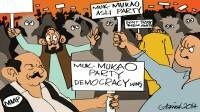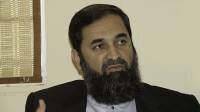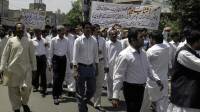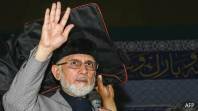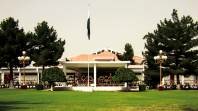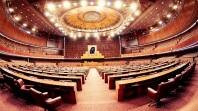After the devolution of federal powers under the 18th amendment, many of the state’s responsibilities were handed over to the provincial governments, including education. It was surprising then, when the government decided to retain a federal ministry for education. Formed in 2011, it was reformed as the Ministry of Education, Trainings and Standards in Higher Education. Its office in the secretariat has been occupied by a number of members of parliament, the latest of whom is PML-N’s MNA from Bahawalpur, Muhammad Baleegh-ur-Rehman.
A soft spoken, pleasantly disposed, hard working man sometimes referred to with the prefix of engineer behind his name – because of his education, an engineering degree from the University of Pennsylvania – Baleegh-ur-Rehman is in charge of two other ministries, the Minister of State for Interior and the Minister of State for Narcotics Control. He says due to the added work load he faces difficulties keeping a focus on education affairs, and goes on to say that, “I didn’t ask for three ministries but the Prime Minister gave me these assignments and I am trying to fulfill my duties as per my leader’s expectations.”
Having worked in education before, he is also a director in the Punjab Education Endowment Fund and was special assistant to Chief Minister Punjab Shahbaz Sharif during the previous PPP government.
Brushing aside objections from some quarters on the existence of the new state ministry of education, he says that there was consensus among various stakeholders that technical, vocational and higher education were federal subjects.
“Only primary and secondary education was devolved under 18th amendment, and not even those entirely. The federal government had two institutions, BECS and NCHD which were imparting primary and secondary education but when we handed over these departments to provinces they refused to run them. Then, the Supreme Court also in its judgment observed that it was the equal responsibility of federal and provincial government to give free, compulsory education under Article 25A of the constitution. Therefore the federal government had no option but to revive education ministry.”
In the 2013 election campaign, his political party promised to increase the financial allocation of education to at least by 4% of GDP. According to the UNDP Human Development Report 2013, only seven developing countries in the world were spending less on education than Pakistan.
Baleegh-ur-Rehman admits that it hasn’t been easy living up to that promise. So far the target hasn’t been met, but there are hopes for the upcoming budget. “Provincial education ministries are also trying to get education budget increased and there is consensus between federal and provincial ministries over its increase. We are confident that this time the education budget will see a substantial increase,” he says, but footnotes that confidence with the caution that political and social turmoil can always interrupt the governance process.
The major chunk of budget allocated for education is earmarked for primary and secondary education. The HEC, contrary to popular belief, gets only a small piece of the pie. The HEC was often in the media limelight for its public tussles with the education ministry during its former chairman Dr Javed Laghari’s tenure. Baleegh says it’s a less confrontational atmosphere now that the HEC is under Dr Mukhtar Ahmed, and the minister has no complaints with the commission so far, “We respect their autonomy and have no issues with them.”
The ministry’s own focus is very much on primary education. The federal government runs the nationwide Non-Formal Primary Education Programme in all provinces and regions of Pakistan, the institutions set up under this program are called ‘Basic Education Community Schools’, or BECS, which comprise thousands of schools in the country including FATA, Khyber Pakhtunkhwa, Balochistan, Sindh, Punjab, Gilgit-Baltistan, AJ & Kashmir and Islamabad (ICT).
3 million school children have been educated by BECS since they were established in 2006 and current enrollment stands at an impressive 6 million. The BECS prefer to enroll female students and employ female teachers to impart education in its schools; 80% of the teachers are females, and 60% of the learners are female.
In each BEC School, 30 learners aged 4-16 years are instructed by a single teacher through multi-grade teaching methods, based on concurrent curriculum. The teachers’ honorarium, learning material and text books are provided by the federal government.
An ambitious project, aimed at the eradication of illiteracy and attaining universal primary education. But for the last many years all the reports spoke of ghost BECS buildings rendered empty because of a scarcity of funds. Baleegh has personally sought to address this problem, “Now their issues have been resolved and the teachers have received their overdue salaries after a period of almost 11 months without being paid. We are also improving existing evolution and monitoring mechanism to plug the holes in the system.”
The other problem Baleegh is directly tackling is the non-uniformity of curriculum after the devolution of education ministry to the provinces. “We have revived Inter-Provincial Education Ministers’ Conference (IPEMC) forum which had become dysfunctional after devolution of education ministry and have decided in principle from this forum that a National Curriculum Council will be constituted to form uniform curriculum for the whole country,” he says.
The IPEMC had been placed under a planning commission after devolution but is now being headed by the federal education ministry. The curriculum formed by the proposed National Curriculum Council will also be applicable to private educational institutions.
The minister emphasizes the need for establishing provincial educational regulatory authorities to monitor and regulate private schools in the country. “We have Islamabad Capital Territory Private Educational Institutions Registration and Regulation Authority (ICT-PIERA) but the provinces lack such oversight mechanism,” he says.
The past year has also seen Baleegh’s ministry make the National Plan of Action for achieving Millennium Development Goals (MDGs). “We invited Gordon Brown and succeeded in securing $100 million from the Global Partnership for Education that will be spent in Sindh and Balochistan. With the help of European countries especially Germany we have revised technical education curriculum.”
But the year hasn’t seen progress on all fronts.
The PML-N announced the National Internship Programme in last year’s budget to help graduates start out in the job market. The initiative fell directly under state ministry of education but the much trumpeted plan is now on the shelf. Baleegh says there were incentive problems in the initiative, the youth remained largely indifferent to it as nobody wanted to work minimum wage on a non-permanent contract after they had gone through the entire financial ordeal of a university graduation.
There’s also the waning Malala Fund, established with an initial endowment of Rs 1 billion given to Pakistan during the previous regime. The minister explains, “When the PML-N came into power, no progress had been made in the fund that is supervised by UNESCO. We took up the matter with the DG UNESCO during her recent visit to Pakistan, she has assured us that she’s making efforts to increase the fund as per the original agreement.”
The minister isn’t discouraged by criticism on these matters. He thinks that a one year evaluation is too incomplete a picture, he has faith in his plans for the future.
His ministry is all set to establish Technical High Schools in the country. “Technical education is less than 1% in Pakistan. We aim to increase it by 15%. These Technical High Schools will be model schools and we will ask the provinces to replicate them,” he adds.
He also wants to increase access to higher education for youth aged 17-23, currently only estimated 15% of that demographic in the country get this access. “It is also part of my ambition to establish 40,000 more non-formal schools in the country as currently their number (18,000) is far less than required,” he concludes.


